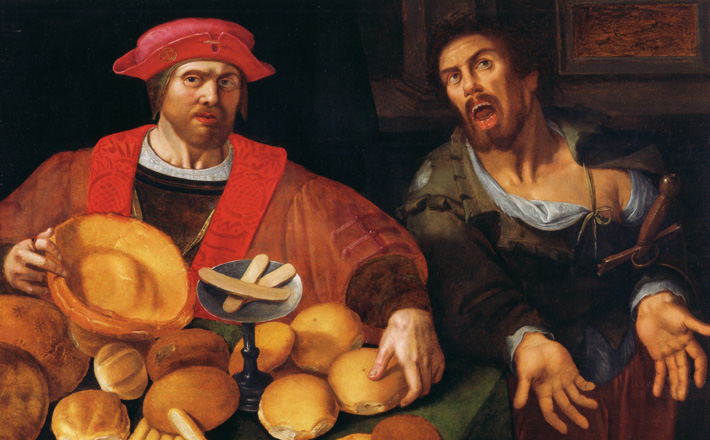Commentary on Psalm 113
Psalm 113, which begins and ends in “Hallelujah” (113:1a, 9c), participates in the grand drama of the Psalter which moves from lament to praise, from cries of “My God, my God, why have you forsaken me?” (Psalm 22:1) to imperative calls to praise the LORD: Hallelujah!
The formulaic call to praise the LORD, Hallelujah, is repeated more than fifty times in the entire Psalter. The vast majority of these are found in Book V (Psalms 107-150), with the majority of those coming in the final five psalms, Psalms 146-150. The Hebrew name for the Psalms, Tehillim (literally “praises”), is thus a fitting name for a collection of psalms that, while reflecting the “anatomy of all the parts of the human soul” (Calvin), moves inexorably toward the praise of God. And Psalm 113 marks a decisive moment in the journey of all “servants of the LORD” toward their ultimate destiny to praise (113:1).
In short, Psalm 113 invites us, the readers, to join the saintly procession.
The Call to Praise
“Hallelujah” means “praise Yah!” “Hallelu” is the plural imperative form of the verb “to praise”: “Praise ye!” And “Yah” is the shortened form of the Tetragrammaton, YHWH, the name of God. Most modern English translations render YHWH/Yah in small capital letters: LORD. Hence, Praise the LORD!
Readers of the Psalter may be surprised to learn that, with the early exception of Psalm 22, the Psalter first directs us to praise the LORD (Hallelujah!) only in Psalm 104, at the end of that majestic hymn of descriptive praise. Psalm 105 also concludes with “Hallelujah,” and Psalm 106 both begins and ends with the imperative call to praise. In this way, Book IV of the Psalter (Psalms 90-106) begins to pivot decisively toward praise, toward the thematic mood that will dominate Book V.
What has happened in Book IV that has opened the doors of praise?
Before the eruption of Hallelujah in Psalms 146–150, which conclude the Psalter and in which the psalmist commands praise of God twenty-eight times, the praise-imperative appears in seven earlier psalms (111, 112, 113, 115, 116, 117, and 135) in Book V. Psalm 113, along with Psalm 135, is conspicuous among them for both beginning and ending with Hallelujah.
Hallelujah!
Hallelu, O servants of the LORD,
Hallelu the name of the LORD!
…
Hallelujah! (113:1, 9 author’s translation)
The psalm anticipates the conclusion of the Psalter and, within the inclusion of praise, gives the principal reasons that God’s servants should praise the LORD. It tells us what has happened in Book IV that has opened the doors of praise.
Reasons to Praise
The Psalter is a collection of 150 individual psalms. And those individual psalms have been organized to take their readers through a journey. That is, the Psalter has a story to tell.
The story, at its most basic level, is about kingship. The first three books of the Psalter (Psalms 1-41; Psalms 42-72; Psalms 72-89) may be understood to tell the story of King David and the Davidic monarchy. Briefly, Psalm 2 speak of David’s inauguration; numerous other psalms reference events in David’s life, such as his struggle with his son Absalom (Psalm 3), his escape from the murderous designs of Saul (Psalm 18), and his adultery with Bathsheba and murder of her husband (Psalm 51); and Psalm 89 laments the demise of the Davidic monarchy with the fall of Jerusalem to the Babylonians in 587 BCE. Psalm 89 complains,
But now you have spurned and rejected him;
you are full of wrath against your anointed.
You have renounced the covenant with your servant;
you have defiled his crown in the dust. (89:38-39)
Books I–III tell the story of the Davidic monarchy from beginning to end. And the demise of the monarchy in 587 BCE placed under question the kingship of God who, according to the Psalm 89 and 2 Samuel 7, had promised David an eternal kingship forever. The demise of human kingship placed in doubt the kingship of God.
Book IV responds to the political and, more importantly, theological crisis brought on by the demise of the Davidic monarchy and its implications for God’s kingship by proclaiming that God was, is, and will be king, not only over Israel but over all nations and all creation. This is the proclamation of Psalms 93-100: “The LORD is king!” (93:1; 97:1; 99:1).
In Book V, the faith that, despite what has happened to the human king David, God remains king motivates the drive to praise. Thus Psalm 113 exhorts:
The LORD is high above all nations,
and his glory above the heavens.
Who is like the LORD our God,
who is [enthroned] on high,
who looks far down
on the heavens and the earth? (113:4-6)
Why praise the LORD? Because the LORD is king, has been, and will be.
The evidence of this kingship is yet another reason for praise. God’s kingship, it turns out, is manifest in a preferential option for the poor: God raises them, lifts them, and gives them a seat among nobles (113:7-8). The implications are two: God looks with special interest on the poor, and there will be no poor in God’s kingdom. Neither will there be barren women. Rather, they will have a household, full of joy and children (113:9). The kingship of God makes all equal, not in poverty or in mediocrity, but in fullness and nobility. These are the reason to praise.
A Barren Woman Gives Birth
There are numerous barren women in the Bible who, through God’s gracious intervention, give birth to children. Hannah, whose song echoes the themes of Psalm 113, come to mind and, through her song, the Magnificat of Mary, mother of Jesus (1 Samuel 2; Luke 1:46-55).
Given these connections, is it any surprise that Jesus identifies himself with the hungry, the naked, the imprisoned, and the sick (Matt 25:31-46)? As with the kingship of the LORD, so too with the reign of Jesus, it is the poor and the needy who will be raised, lifted, and seated with the nobles.
Hallelujah!


September 18, 2016